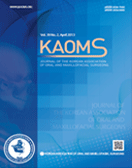Journal of the Korean Association of Oral and Maxillofacial Surgeons
- P-ISSN2234-7550
- E-ISSN2234-5930
- SCOPUS, KCI, ESCI
 ISSN : 2234-7550
ISSN : 2234-7550
Association between soluble forms of the receptor for advanced glycation end products and periodontal disease: a retrospective study
Yun Jong Lee (Seoul National University Bundang Hospital, Seongnam, Korea)
Soyeon Ahn (Seoul National University Bundang Hospital, Seongnam, Korea)
Yoon-Seok Chang (Seoul National University Bundang Hospital, Seongnam, Korea)
Yonghoon Choi (Seoul National University Bundang Hospital, Seongnam, Korea)
Hyo-Jung Lee (Seoul National University Bundang Hospital, Seongnam, Korea)
Abstract
Objectives: Periodontitis is the most common chronic disease that causes tooth loss and is related to systemic diseases such as cardiovascular dis-ease and diabetes. An objective indicator of the current activity of periodontitis is necessary. Soluble forms of the receptor for advanced glycation end products (sRAGE) are markers that reflect the status of inflammatory diseases. In this study, the relationship between sRAGE and periodontitis was analyzed to determine whether it can be used to diagnose the current state of periodontitis. Patients and Methods: Eighty-four patients without any systemic diseases were diagnosed with periodontitis using three classifications of peri-odontitis. Demographics and oral examination data such as plaque index (PI), bleeding on probing (BOP) index, and probing pocket depth (PPD) were analyzed according to each classification. In addition, correlation and partial correlation between sRAGE and the values indicating periodontitis were analyzed. Results: In each classification, the level of sRAGE tended to decrease if periodontitis was present or severe, but this change was not statistically sig-nificant. sRAGE and periodontitis-related variables exhibited a weak correlation, among which the BOP index showed a relatively strong negative cor-relation (ρ=–0.20). Based on this, on analyzing the correlation between the BOP index and sRAGE in the group with more severe periodontitis (PPD≥5 mm group, severe group of AAP/CDC [American Academy of Periodontology/Centers for Disease Control and Prevention], periodontitis group of López), the correlation further increased (ρ=–0.23, –0.40, –0.50). Partial correlation analysis of the sRAGE and BOP index showed a stronger negative correlation (ρ=–0.36, –0.55, –0.45). Conclusion: sRAGE demonstrated a tendency to decrease upon increased severity of periodontitis according to the classifications used. Above all, the correlation with the BOP index, which reflects the current state of periodontitis, was higher in the group with severe periodontitis. This indicates that the current status of periodontitis can be diagnosed through sRAGE.
- keywords
- Receptor for advanced glycation end products, Periodontal index, Periodontitis, Bleeding on probing index
- Downloaded
- Viewed
- 0KCI Citations
- 0WOS Citations